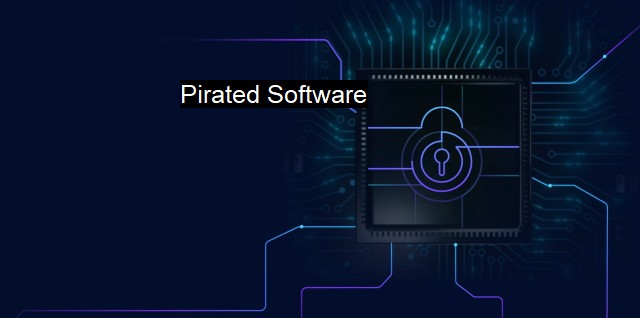What is Pirated Software?
The Costly Consequences of Pirated Software: Security Threats, Legal Ramifications, and Financial Losses for Developers
Pirated software, also known as cracked or unlicensed software, refers to any illegal version of copyrighted programs, usually applications, made available to end-users for free or at significantly reduced prices. Broadly speaking, it involves the unauthorized copying and selling, distribution, or use of proprietary computer software. Originating from the term 'Pirate", it essentially equates to stealing, but unlike ordinary theft, it targets intangible items, mainly intellectual property.The use of pirated software poses serious security threats to individuals and organizations alike. This is because cracked software often contains hidden or embedded malicious codes, viruses, spyware, or other potentially harmful programs. Besides, they typically lack patches, updates, and security fixes that genuine software counterparts receive with regular frequency from developers, thereby making them vulnerable to diverse threats anchored in the cybersecurity landscape.
Pirates, hacktivists, and cybercriminals often use pirated software as a gateway to insert malware onto victim's devices to exploit or manipulate information to their advantage. Once a user downloads and installs a pirated program, the embedded malware becomes active and begins to infiltrate the system without the user's knowledge. Whether these unauthorized programs serve to launch significant cyberattacks, conduct espionage, or facilitate identity theft, their consequences are invariably profound.
One widespread threat associated with pirated software is the dissemination of ransomware. This insidious malware can lock a victim's files using complex encryption and demands a ransom payment in exchange for the decryption key. If the user doesn't comply within the specified time frame, the criminal may either destroy the encryption key or post the sensitive stolen files on the internet for the public or other criminals to access.
Pirated programs also foster the propagation of trojans and bots. Trojans are disguised as benign applications but carry harmful codes that allow an attacker to gain remote control over a victim's system. On the other hand, bots can allow an attacker to control infected devices, or 'zombies,' to perform specific functions even without the owner's awareness.
Pirated software can equip cyber assailants with backdoors for illicit network infiltration. Such unconstrained access could challenge an organization’s network integrity or let rogue players entrench themselves firmly within an individual’s personal space, with dire consequences spanning data devastation to privacy breach.
In the light of these cyber threats, it becomes all the more important to use legal, trustworthy software supported by conventional antivirus solutions. Good-quality antivirus software can thwart most malware that might come along with pirated software. Given that it undergoes regular updates, such technology can combat new and emerging threats more effectively.
Antivirus software shouldn't be the only shield against cyber threats. Cybersecurity best practices go far beyond that, demanding compliance with keeping software and systems updated, secure, and regularly patched from potential security loopholes. Also, training and sensitization towards identifying suspicious activity and exercising cautious behavior online can significantly mitigate cyber risks.
Refraining from downloading and using pirated software is best for combating unethical practices and promoting cybersecurity. For the software industry to thrive, it's vital to acknowledge and respect intellectual property rights. By avoiding pirated software and encouraging the use of licensed versions, a culture of ethical software usage can be nurtured, preventing potential security threats and unintentional copyright infringements.
While pirated software may seem an attractive option due to its lowered or non-existent costs, the cybersecurity risks that come attached significantly outweigh any immediate monetary gains. The potential for exposing devices or networks to malware, jeopardizing vital personal or organizational data, and infringing intellectual property rights far underline the inevitability to avoid pirated software and adhere to certified and legitimate digital practices. This approach aligns perfectly well with the broader goals of fostering tech-enhanced growth and human-centric digital transformation.

Pirated Software FAQs
What is pirated software?
Pirated software is unauthorized and illegally copied software that is distributed or sold without the permission of the software's owner. It is also known as counterfeit software or unlicensed software.Is using pirated software safe?
No, using pirated software is not safe as it can be infected with malware or viruses that can harm your computer or compromise your security. Additionally, pirated software may not receive security updates, leaving your system vulnerable to attacks.What are the consequences of using pirated software?
Using pirated software can lead to legal consequences, such as fines or even imprisonment. Additionally, it can harm your computer, compromise your data, and put your privacy at risk. It can also damage the reputation of the company or individual using the software.How can I avoid using pirated software?
You can avoid using pirated software by purchasing licensed software from reputable sources. You should also avoid downloading software from untrusted websites or torrents, as they are often sources of pirated software. Additionally, be wary of offers for free or discounted software, as they may be pirated.| | A | | | B | | | C | | | D | | | E | | | F | | | G | | | H | | | I | | | J | | | K | | | L | | | M | |
| | N | | | O | | | P | | | Q | | | R | | | S | | | T | | | U | | | V | | | W | | | X | | | Y | | | Z | |
| | 1 | | | 2 | | | 3 | | | 4 | | | 7 | | | 8 | | |||||||